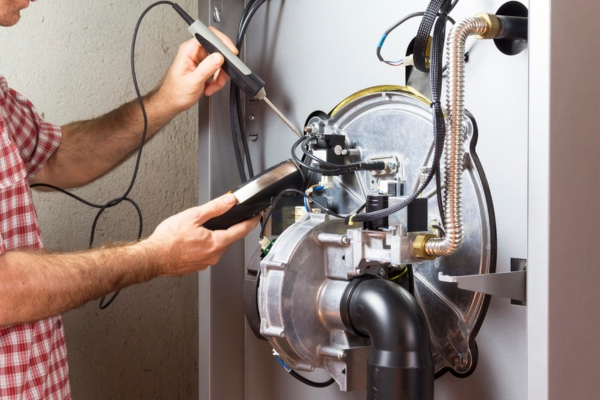Table of Contents
- The Value of Routine Heating Oil Filter Replacements
- What Does a Fuel Oil Filter Do?
- Advantages of Regular Heating Oil Filter Replacement
- Recommended Frequency for Changing Your Fuel Oil Filter
- Signs That Your Heating Oil Filter Needs Changing
- Steps for Changing an Oil Filter
- Guidance on Replacing Heating Oil Filters
- Heating Oil Filter Replacement FAQs
- Why Should You Keep an Eye on Your Heating System After Changing the Filter?
- What Signs Show That a Fuel Oil Filter Change Was Effective?
- Does Consistently Changing Oil Filters Affect My Warranty?
- How Can Homeowners Ensure They Select the Right Fuel Oil Filter for Their Heating System?
- What Steps Should Be Taken If Replacing the Oil Filter Doesn’t Fix Heating Problems?
- Conclusion
- Contact County Line Fuel for Dependable Heating Oil Delivery
Heating expenses can be steep, often accounting for almost half of your monthly energy costs, significantly more than any other household appliance. It’s crucial to concentrate on heating efficiency to cut down on these costs. This article from County Line Fuel includes effective strategies to boost your system’s performance, with a particular emphasis on the benefits of consistent heating oil filter replacements. You can achieve considerable energy savings by understanding and applying these methods.
The Value of Routine Heating Oil Filter Replacements
Keep reading to learn about the importance of oil filter changes and how they impact your system’s efficiency, longevity, and operating costs.
What Does a Fuel Oil Filter Do?

Every home that uses fuel oil appliances has a heating oil filter. This filter is crucial as it cleans the fuel of contaminants before it arrives at the burner. It stops dirt and moisture from blocking the fuel nozzle and ensures the pump’s smooth operation. Maintaining a functional filter is essential to prevent system lockouts and avoid damage to the equipment. Hence, regular heating oil filter replacements are necessary.
Seeking Top-Quality Heating Solutions? Choose County Line Fuel for expert care and reliable warmth throughout winter. Contact us now!
The Critical Need for Frequent Oil Filter Changes
Filters often fall prey to their effectiveness. Over time, as they trap more contaminants, they become less permeable, diminishing the oil’s flow rate until it halts entirely. Occasionally, some accumulated dirt might enter the system, leading to blockages. It’s crucial to replace the oil filter before such issues arise. Remember that each new filter will eventually face the same challenges, necessitating regular replacements as part of your heating maintenance routine. Fortunately, changing filters is a quick and straightforward task that offers numerous benefits.
Advantages of Regular Heating Oil Filter Replacement
Consistent maintenance yields significant rewards. While heating oil filter replacements might seem minor, professionals emphasize its critical importance for anyone with an oil-fired boiler or furnace. The impact of this simple task should not be overlooked. Here are a few key benefits that come with regular filter replacements:
Enhancing the Reliability of Heating Oil Equipment

For optimal performance, heating systems require a consistent flow of clean oil. Any obstruction, like a clogged filter, can lead to reduced efficiency. A dirty filter might cause your heating system to struggle, inadequately warming your home, or, in the worst case, result in a complete system failure, leaving your household cold during winter. Prevent these issues by enhancing your system’s reliability through regular upkeep. Timely filter replacements ensure smooth and effective operation.
Need Heating Expertise? Connect with County Line Fuel for premier service and unparalleled comfort. Contact our specialists today!
Preserving Optimal Heating Efficiency
The efficiency rating on your system’s label won’t last indefinitely. Wear and tear, as well as dirt accumulation, lead to a gradual decrease in performance. Inefficient heating systems use more fuel to generate heat, exacerbating environmental issues like high carbon emissions.
To maintain high efficiency, it’s crucial to arrange for annual professional maintenance. During these visits, HVAC technicians can conduct comprehensive tune-ups. Remember to replace the oil filter following the manufacturer’s recommended schedule. Adhering to these practices will ensure your HVAC system continues to run efficiently, almost like new.
Extending the Lifespan of Your HVAC System

Installing fresh oil filters helps maintain the cleanliness of your home heating system, making it easier to prevent hazardous clogs and other issues. These filters alleviate stress on various components, enhancing their durability.
Consequently, the overall lifespan of your heating system is significantly extended, potentially serving as a reliable fixture in your home for more than a decade. By avoiding the need for premature system replacement, you save money while continuing to benefit from its efficient performance.
Significant Savings on Heating Costs
As mentioned, clean oil filters are critical in reducing energy consumption. They contribute to environmental protection by lowering emissions and helping homeowners cut down on their heating bills. This benefit is significant during periods of uncertainty when fuel supplies may be scarce and oil prices elevated. By ensuring your oil filters are regularly replaced, you can maintain manageable heating costs year after year.
Is Your Heating System Winter-Ready? County Line Fuel provides expert heating services to ensure your comfort. Call us today!
Recommended Frequency for Changing Your Fuel Oil Filter
It’s advised to replace your heating oil filter at least once annually, ideally before the heating season starts, to guarantee effective oil filtration. Monitor your system’s performance during winter for any signs of reduced efficiency. If you notice filter clogs, consider adjusting the replacement schedule to twice a year. Adding a mid-season filter change can help prevent further issues.
Signs That Your Heating Oil Filter Needs Changing

Be vigilant about your heating system’s performance. Below are indicators your home heating oil filter needs replacing:
- Slow Starts: If you are familiar with how your furnace or boiler typically operates, any deviation, such as slow starts or atypical noises, should raise concerns. These unusual behaviors can be symptomatic of a clogged filter, indicating it’s time for a replacement.
- Dark Smoke: While light-colored smoke is normal, dark smoke emanating from your chimney is not. This could indicate that water has breached the oil filter. Reflect on when the filter was last changed; if it’s been some time, it may be saturated with moisture and debris, signaling that replacement is overdue.
- Subpar Performance: Are you feeling chilly inside your home? Do you notice any lack of response when adjusting the thermostat? If your heating system fails to provide sufficient warmth or unexpectedly shuts off, a dirty oil filter could be to blame. This issue might originate from the filter itself or another closely linked component.
Looking for Dependable Heating Services? County Line Fuel offers expert heating solutions designed for both efficiency and reliability. Contact us for service today!
Steps for Changing an Oil Filter
Follow these detailed steps to ensure a smooth and safe replacement of your heating oil filter:
- Ensure safety by shutting off the power before adjusting the system.
- Place a pan under the filter to catch oil droplets and keep the area clean.
- Stop oil flow by closing the shut-off valve on your heating oil tank. Unscrew and remove the base of the oil filter canister.
- Extract the used filter cartridge and any old gaskets.
- Thoroughly clean the filter canister and the pump strainer before installing a new filter.
- Reassemble the canister and securely reattach it to its mounting.
- Turn the supply valve back on and restore power to the system.
- Open the air bleeder screw to release any trapped air.
- Operate the oil burner and monitor its performance for any irregularities.
- Check the system thoroughly for any signs of oil leaks.
- Conclude the task by properly disposing of the old filter once everything checks out.
Guidance on Replacing Heating Oil Filters

Here are some practical tips to follow when replacing your heating oil filter:
- Oil can irritate the skin. Therefore, wear gloves to protect your hands and arms, and consider an apron to prevent stains on your clothes.
- Handle the filter canister carefully to prevent it from dropping and potentially damaging the pipes.
- Keep track of the small, crucial components like rings and washers in the filter assembly to ensure none are lost.
- Be alert for leaks—they might not appear immediately. It could take up to two days for leaks to show.
- Replacing an oil filter can be messy and hazardous. If you feel uncertain about performing this task, it’s wise to hire a professional.
Looking for Expert Heating Services? County Line Fuel is your reliable partner for all your heating requirements, providing comfort and safety. Reach out to us today!
Heating Oil Filter Replacement FAQs

Why Should You Keep an Eye on Your Heating System After Changing the Filter?
It’s vital to observe your heating system after installing a new filter to spot any decline in performance or abnormal activities quickly. This helps identify and address issues promptly, maintaining consistent system efficiency.
What Signs Show That a Fuel Oil Filter Change Was Effective?
Indications of a successful oil filter change include enhanced heating efficiency, no strange sounds or leaks, and the system reaching set temperatures more effectively.
Does Consistently Changing Oil Filters Affect My Warranty?
Absolutely. Regular maintenance, such as oil filter changes, is often a stipulation in HVAC system warranties. Neglecting these upkeep tasks can result in a voided warranty, underscoring the need for regular system care.
Searching for Professional Heating Services? County Line Fuel offers expert precision and top-tier professionalism in heating solutions. Contact us today for outstanding service!
How Can Homeowners Ensure They Select the Right Fuel Oil Filter for Their Heating System?
To guarantee the selection of the appropriate oil filter, homeowners should consult their heating system’s manufacturer guidelines for the required filter specifications or seek advice from a professional HVAC technician, which is essential for maintaining peak system performance.
What Steps Should Be Taken If Replacing the Oil Filter Doesn’t Fix Heating Problems?
Should issues continue even after replacing the oil filter, it could signal more complex problems within the system. A qualified HVAC technician should perform an extensive diagnostic evaluation to pinpoint and remedy deeper issues.
Conclusion
Oil filters are essential for keeping furnaces running smoothly by preventing clogs, but they don’t last forever. To sustain high efficiency, reliability, and optimal performance, you need heating oil filter replacements regularly. If you’re uncomfortable changing the filters, feel free to call a professional. This ensures a hassle-free replacement and keeps your heating system in top condition.
Enhance Your Home’s Warmth with County Line Fuel – Reach out today for expert heating services that boost your comfort and efficiency. Call now!
Contact County Line Fuel for Dependable Heating Oil Delivery

County Line Fuel is dedicated to keeping homes and businesses warm with timely and reliable heating oil delivery in Clinton, NJ, and the surrounding areas. Our focus on delivering high-quality fuel efficiently ensures you receive both uninterrupted comfort and competitive rates.
Beyond just supplying heating oil, County Line Fuel offers a full range of HVAC services, making us your one-stop shop for all that is related to home comfort. Whether installing new systems, providing regular maintenance, or addressing urgent repairs, we provide outstanding care for all your HVAC needs.
Choosing County Line Fuel means selecting a partner committed to excellent service and customer satisfaction. With a strong reputation for reliability in our community, we encourage you to take advantage of a free consultation. Reach out to us today to find out more!
You can click here to contact us now or call us at (908) 735-7610 to find out more! Click the link to view our service area.
Related Articles:
- The Best Ways To Prevent Running Out Of Heating Fuel This Winter
- Essential Tips for A Successful Oil Boiler Installation
- What You Need To Know About A Double-Wall Heating Oil Tank
- Unveiling Oil Tank Condensation: Essential Insights for Homeowners
- What Causes the Whistling Noise During Oil Deliveries?
